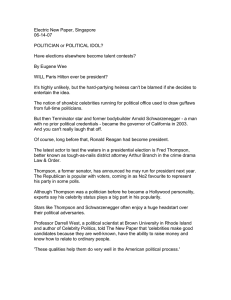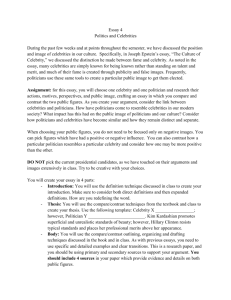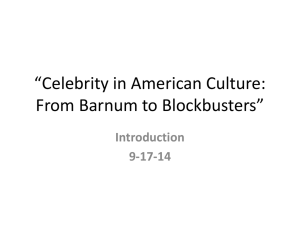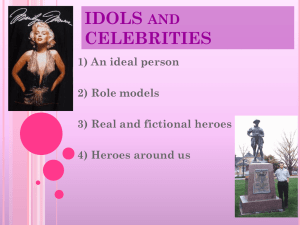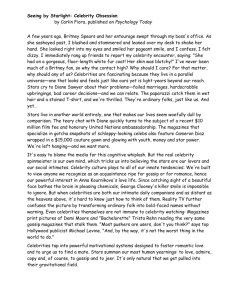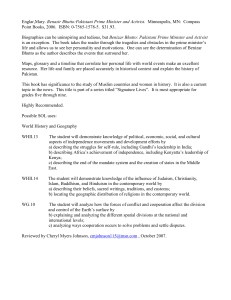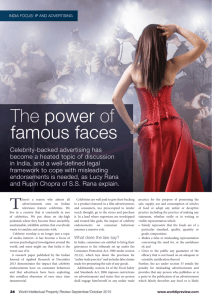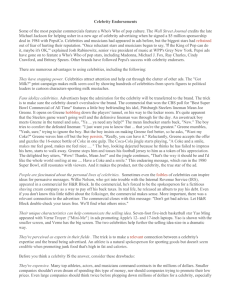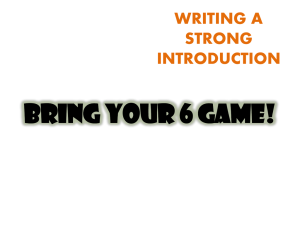File - Samantha Calarusse`s Teaching Beyond Boundaries
advertisement
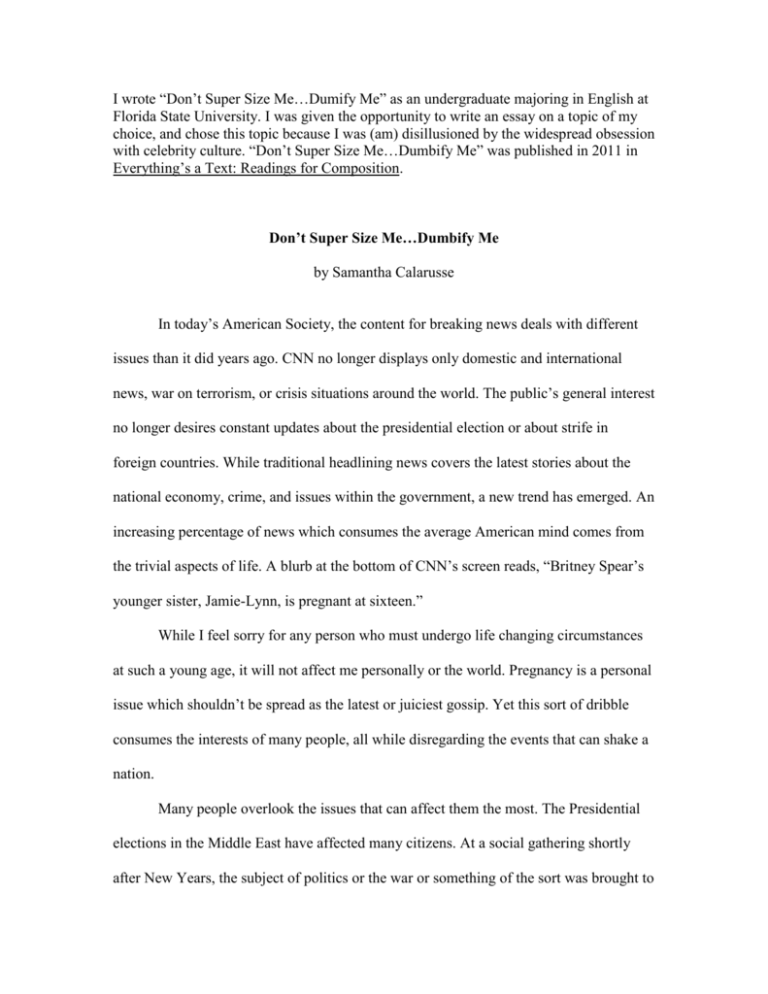
I wrote “Don’t Super Size Me…Dumify Me” as an undergraduate majoring in English at Florida State University. I was given the opportunity to write an essay on a topic of my choice, and chose this topic because I was (am) disillusioned by the widespread obsession with celebrity culture. “Don’t Super Size Me…Dumbify Me” was published in 2011 in Everything’s a Text: Readings for Composition. Don’t Super Size Me…Dumbify Me by Samantha Calarusse In today’s American Society, the content for breaking news deals with different issues than it did years ago. CNN no longer displays only domestic and international news, war on terrorism, or crisis situations around the world. The public’s general interest no longer desires constant updates about the presidential election or about strife in foreign countries. While traditional headlining news covers the latest stories about the national economy, crime, and issues within the government, a new trend has emerged. An increasing percentage of news which consumes the average American mind comes from the trivial aspects of life. A blurb at the bottom of CNN’s screen reads, “Britney Spear’s younger sister, Jamie-Lynn, is pregnant at sixteen.” While I feel sorry for any person who must undergo life changing circumstances at such a young age, it will not affect me personally or the world. Pregnancy is a personal issue which shouldn’t be spread as the latest or juiciest gossip. Yet this sort of dribble consumes the interests of many people, all while disregarding the events that can shake a nation. Many people overlook the issues that can affect them the most. The Presidential elections in the Middle East have affected many citizens. At a social gathering shortly after New Years, the subject of politics or the war or something of the sort was brought to attention. Out of a college group of seniors, only three people out of the ten knew Bhutto had been assassinated. Only two of those three people knew the back story and its implications for Pakistan. Those who were unaware asked, “Who is Bhutto?” To which the knowledgeable replied, “Benazir Bhutto.” “Running for political office in Pakistan,” said another. “First female Prime Minister of any Muslim country,” I said. While Bhutto’s life and career should have been common knowledge after being in the news, many people in the United States still know more about the celebrities than its political leaders. Personally, I do not read, watch or seek out any awareness for celebrities, yet I seem to know about them anyways. In the line at the grocery store tabloids read: “Angelina Jolie is pregnant with Twins.” “Jennifer’s jealous again.” During news break on the radio I hear, “Yes, twins. And she and Brad plan to adopt more as well.” These are tabloid headlines, phrases on the radio, blurbs on new stations, and gossip heard in the hallways. One astounding radio conversation occurred on Martin Luther King Jr. Day. I was listening to Blazin’ 102.3, a prominent rap station in my town. The DJ allowed callers to give shout-outs to their friends or request songs. A young girl, later established as being ten years old and African American, requested the newest song by Snoop Dogg. Because the girl sounded so young, the DJ asked her why she wasn’t in school. “We had the day off. Can I request my song now?” she asked. “In a minute. Can you tell me why you don’t have school today?” She responded after a few seconds. “It’s MLK day.” “Do you know who he was?” The DJ was obviously testing the girl’s knowledge. “I dunno.” This response came after a few moments and whispers in the background with other people. “But you do know who Snoop Dogg is though, right?” “Duh, he’s famous.” Astonished, I sat on my bed and wondered how a fourth grader could not identify one fact about MLK. If this child couldn’t recognize any of his accomplishments while alive, what else did she not know? Was this the new America—dumbed down by pop culture instead of high culture? This brings us to an interesting shift into the basics of knowledge. A name is simple. It identifies who we are, who we have been, and who we can be. I had a conversation with a friend recently; she is in tune with all aspects of politics, sports, yet doesn’t pay much attention to the lives of celebrities. So, I asked her a few questions that I will ask you now. Let’s play a game. I’ll say a name and you tell me who it is. “Britney.” Yes, Britney Spears. “Lindsey.” Yes, Lindsey Lohan. “George.” Okay, let’s say George Clooney, but what about George W. Bush, George Orwell, even Curious George? Society relates to celebrities as if they live next door; we have known them for years via television and blockbuster hits, yet they wouldn’t recognize us from a can of tuna. Does watching a celebrity grow/ prosper in the spotlight entitle us to the in’s and out’s of someone’s life? Britney Spears is the prime example at the moment. The lime light has taken Britney from the Mickey Mouse Club to psychotic breakdowns, the loss of her children, divorce, a harsh comeback, drunk driving and more. It has taken Whitney Houston from I Will Always Love You to her abusive relationship and cocaine addiction. From Mariah Carey singing Butterfly to jokes about her on sitcoms saying, “I just saw Mariah eating Ramon in her nighty.” Even Mary-Kate and Ashley Olsen making the transition from Full House to anorexia. The list is endless. The line between politics and celebrities is easy to see, yet a fine line is barely visible for what constitutes real news. For example, I was searching the Internet for movie times one evening. On the main page of Yahoo.com the featured items displayed “Miley Cyrus legally changes her name,” in bold and larger font than the surrounding text. The small cramped box below this trivial celebrity formality discusses the news. In plain text, “Lebanese mourn Hezbollah militant and Hariri.” It seems more people living in the United States care about silly celebrity facts than a bill being passed in Congress; more about Hilary Clinton’s masculine-turnedfeminine appearance than the political issues she supports; more about Angelina Jolie’s sex life than her humanitarian efforts. And while I write this essay, I wonder if anyone will remember the facts mentioned throughout a few months or even a year from now? It’s something to think about.
